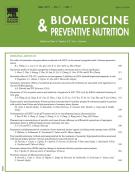Meta-analysis of electrolyte imbalance in human fluorosis - 09/11/12
 , Aggarwal Shashi
, Aggarwal ShashiAbstract |
Fluoride is the most electro-negative of all elements. Ingestion of excess fluoride, most commonly in drinking water, can cause fluorosis which affects the teeth and bones. Moderate amount lead to dental effects, but long-term ingestion of large amounts can lead to potentially severe skeletal problems. The objective of the present study was to elucidate the effect of high ingestion of fluoride in drinking water on electrolyte metabolism in fluorotic patients, selected from seven endemic high fluoride (5.9 to 24.5mg/L) areas of Punjab, India. The levels of calcium, sodium, potassium and phosphorus were determined in serum using kit assay method. Age and sex matched controls consuming water fluoride within permissible limit (0.5–1.0mg/L) were included in the study. The data indicated that the serum level of calcium declined significantly (F 7,997=267.41, P<0.05 to 0.001) whereas sodium ion concentration increased significantly (F 7,997=199.09, P<0.05 to 0.001) in fluorotic patients among all fluoride groups. Potassium and phosphorus level was also increased significantly (P<0.05 to 0.001) in fluorotic patients when compared with control group. There was a significant (r=–0.86, P<0.05) negative relationship between serum fluoride and calcium levels. Correlation analysis indicated highly significant (P<0.05) positive correlation between serum fluoride and sodium (r=0.97), potassium (r=0.90), and phosphorus (r=0.76) in fluorotic patients.
Conclusions |
High fluoride ingestion through drinking water could induce hypocalcemia, hypernatremia, hyperkalemia and hyperphosphatemia in patients of fluorosis.
Le texte complet de cet article est disponible en PDF.Keywords : High fluoride, Hypocalcemia, Sodium, Potassium, Phosphorus
Plan
Vol 2 - N° 4
P. 294-302 - octobre 2012 Retour au numéroBienvenue sur EM-consulte, la référence des professionnels de santé.
L’accès au texte intégral de cet article nécessite un abonnement.
Déjà abonné à cette revue ?

